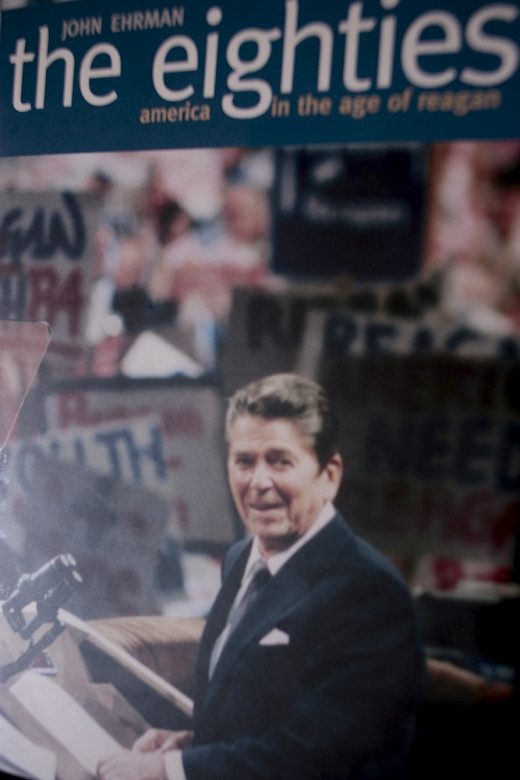The 80s
What Happened -- Maybe

Neoconservatives and neoliberals vie for power
For me, personally, the eighties were the decade prior to the first one that began to blur and blend seamlessly into the next. After the 90s, no one even knew how to say what year it was without the most awkward use and abuse of English. I'm sure I'm not alone in not knowing what decade this is at present. The twenty-tens? I'm just guessing. This last week or so I read a well-written book on the eighties, and all the names and events came back to me, fell into place, and gave me a great sense of well-being and equilibrium. Yeah, I remember. Now, I'm not so sure about the world around me. Before the eighties, there was the sixties, no one yet capable, even today, to sum up what happened in between with any clarity. The more I read, the more I kept thinking of that song by Billy Joel, We Didn't Start the Fire. Its lyrics go from name to name and place to place, a four-minute rundown on just about everything, within a certain timeframe. Maybe somebody could arrange the 1985 tax cut, supply-side economics, trickle-down theory, Granada, Carl Lewis, Michael Jordan, Tip O'Neill, deregulation, the EPA, Michael Milken, the semi-conductor industry, Wal-Marts and category killer stores, malls, Gramm-Rudman, and all the titles of books written by both those in and out of power, Michael Dukakis, the Massachusetts Miracle, Willie Horton, and the Pledge of Allegiance, as well as the Religious Right, into a tune. Would it require a Moog synthesizer? Just wondering....
History with chords and melody
Republicans in the White House
They were not better off four years before when Jimmy Carter beat Gerald Ford in 1976. But the book, The Eighties, is not a paean to Reagan and the triumph of conservatism. The author, John Ehrman, keeps his distance and tells the story as it was. And it is uplifting in a strange way to review a time of upheaval, American style, during which the liberal power structure came undone or at least found itself under siege. It did not really matter one way or another to people in general, whose fortunes and/or misfortunes usually do not involve politics. But there was indeed a sense of a turnaround if not a sea change.
Also, it did not happen overnight. After the Dow sank to 777 in 1982, the Federal Reserve cut interest rates, and within the days ahead, various signals to buy must have gone off in the staid investment houses across the land. I do not remember at what point the bull market of the 1980s took off, but while working in downtown New York and writing a dissertation on a topic in the arts, I got into it along with many others who would not have seemed the type. Only years before, near campus, fellow-students, who had once complained about rents spiraling out of control, reaching above five, six, seven, or eight hundred a month, were now placing trades and reaping rewards in like amounts, sometimes with zeroes attached to the right of the aforementioned sums. It had never been this good. Professional traders were cashing in their chips and migrating upstate to places like Woodstock to manage a small farm or practice a folk craft. The New York Times was invaluable, but not because of the fit-to-print news so much as the stock market listings. And when things hummed, one could only read in awe how, incredibly, stocks rocketed upward in leaps and bounds.
Not long before, few of us, petty but stalwart players that we were, would have given the market a single thought. But now, somebody could study anthropology, do whatever that entailed, and in addition, trade options and warrants for serious returns. At Columbia University, people would stand around at night on Broadway near 110th St. waiting for the arrival of the next morning's edition. It would not be until 1987 that we learned how the faithful fountain that the markets had become was not as dependable as originally thought. But one could always go to a local Charles Schwab outlet and listen to the informed chatter beneath the electronic ticker tape to find out what was what. Some panicked, but others broadened their skills to include short-selling. One did not need private rooms tucked away in plush, big name offices to discuss setbacks with equities that never seemed to have ever let down a shareholder. Indeed, discount brokers eventually proliferated to such an extent that one could set up an account at Sears.
- Dow Jones Industrial Average (1900 - Present Monthly) - Charting Tools - StockCharts.com
The economy was still in recession in the early years of the 1980s. But by the mid-eighties, this was ancient history.
Intellectuals refuse to lie down and die
Ordinary people hate them. There is no question about it. The professorial are forgiven if they hold nice positions and receive ample paychecks. But basically, the intellectual-minded are at the mercy of the masses, uniting both the well-to-do and the down-and-out, mocked and scorned at choice opportunities. That is why I like the inclusion in this book of the plight of young Asians, who study so hard quotas were again introduced, if not always implemented, to thin their populations in universities. The author then goes on to write about deconstruction, postmodernism, patriarchal society, and the Eurocentric, male-based canon of the Humanities or Western Civilization. These topics might seem funny and worthless to the great unwashed, but some of us were trying to master their meanings so as to actually make a living in academia, often enough preferred to non-academia, no matter how sightly and tempting the latter will on occasion appear. These arcane terms, and the numerous books, essays, and lectures they inspired, were also a part and parcel of the eighties.
Freedom still rules
The conservative thrust into the realms of power and prestige was by no means a slaughter. It was so victorious, however, that from then till now, liberals get repeatedly, verbally bashed. But it is hard now to know exactly who they are and what they actually believe or advocate. Or why, for that matter. For a brief spell, their adversaries took over in terms of influence and issues. Reagan, as has so often been stated, was able to accomplish what Goldwater could not. For a while, conservatives had leadership, direction, and momentum. They did not stumble for twelve years straight, and then caved in either to liberalism or reformism or, as likely as not, the popular urge to simply change the channel. Nevertheless, conservatism is as permanent a focus as any in the political spectrum, not only as a positive instructive device for how to live, breathe, and think, but also as a negative defense against all the things that go wrong with liberal governments. Under the latter, actions tend to go haywire and rage out of control -- humanitarian prison furloughs result in recidivism, laxity in drug enforcement ends in addictions and gang control of neighborhoods and schools. And yet, the conservative's flirtation, in the extreme, with fascism, oligarchy, plutocracy, and questionable church-state affiliations are hard to overlook. For the moment, however, freedom still rules.
Patriotism
It often seems as though conservatives are more patriotic than liberals. This is not the case, and yet conservatives are able to get the point across much more effectively than liberals, who are only too apt to get bogged down in wordy critiques. While Democrats scramble to put together the next ceremonial apology (European politicos do this, also), Republicans are setting up another band-playing, flag-waving demonstration. Both will have their day. More to the point, an opportunity was seized during the 1984 Summer Olympics, boycotted by Russia, to display patriotic fervor. Torch runners were cheered all over the United States as they athletically made their way westward.
The Wall comes down
The Most Important Event of the 80s
If the 1980s were slowly, gradually, and inexorably leading up to anything at all, it was this. Not long before, the very idea of the Berlin Wall's destruction was unthinkable. Most of the credit belongs to the Reagan administration, which tenaciously waged cold warfare. But some must go to Gorbachev, who had been, simultaneously, effecting changes in the U.S.S.R. that would lead, he hoped, to greater understanding and cooperation both within and worldwide. As a result, this is no longer the same world it once was. And by this, I hardly mean the arrival of personal computers and electronic gadgetry. I mean a world that is far more open, aware, and globally-minded. The dichotomous world that preceded it was filled with tensions that erupted in violence every now and again at various geographical locations. There are new problems now that were inconceivable at one time, so the current record is not one that can easily be whitewashed. But this world, at present, with all its faults, has a new lease on life.
Final words
I really wish that there were final words. The 80s made an impact. For a while, a concerted Republican-crossover Democrat domestic policy provided great amounts of wealth that ten years earlier would have seemed unrealistic. Wall Street was the engine. But the recipients of the bull market were everywhere -- although there should have been more, if not for the age-old restraints of greed and selfishness. In fact, it is exactly this that detractors objected to. For instance, where did all the homeless come from? This was also the 80-s. In New York City, it was the Democratic National Convention that furnished some relief, since the city wanted to make a better impression for a few days. But then, where did the homeless vanish to? It all goes to show that regardless of how many facts and situations are reported and described, the truth somehow slips away. Since I began on a personal note, I'll end on the same. All in all, it was a good decade. Promise was somehow in the air. But as usual, there were no guarantees.
The flag still waves as do the question marks.

- History of the Olympics - 1984 Olympic Games in Los Angeles
Although the Soviet Union, East Germany, Cuba, and fourteen other countries boycotted the 1984 Olympic Games, China made its first appearance at an Olympic since 1932. - Willie Horton Case, made Famous by a TV Ad during the 1988 Presidential Election
Willie Horton, committed first degree murder in 1974, and later escaped on furlough in Massachusetts and later convicted of kidnapping and rape in Maryland. - http://www.infoplease.com/encyclopedia/history/gramm-rudman-hollings-act.html
Gramm-Rudman-Hollings Act, officially the Balanced Budget and Emergency Deficit Control Act of 1985, U.S. budget deficit reduction measure. The law - The US Invasion of Grenada:
Global Policy Forum is a policy watchdog that follows the work of the United Nations. We promote accountability and citizen participation in decisions on peace and security, social justice and international law.





